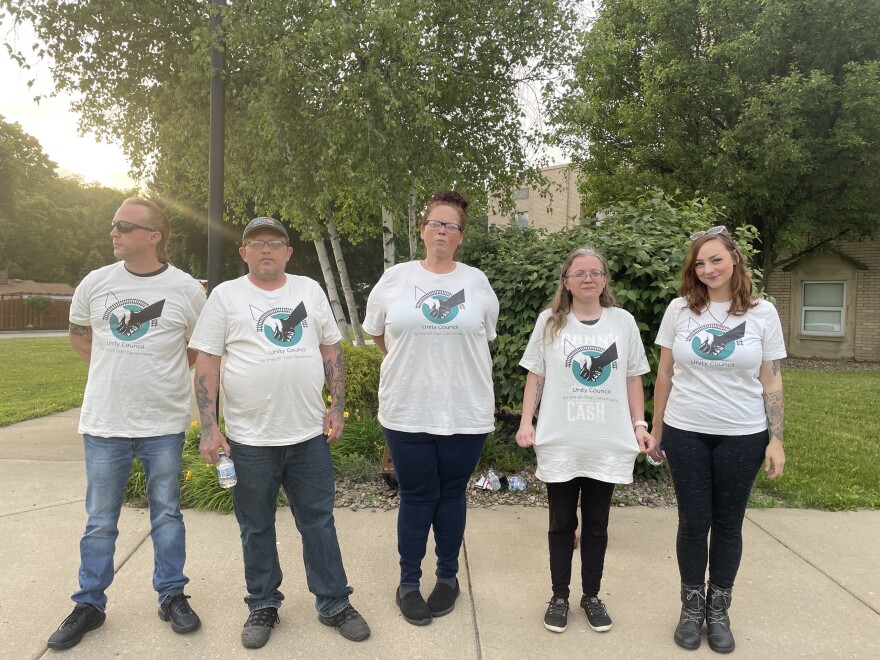I've reported extensively on the East Palestine train derailment since it happened a little more than a year ago.
I've spoken with residents about their concerns regarding their health and the health of the environment. I've interviewed lawmakers about passing stricter regulations to make railroads safer. I've attended town meetings in East Palestine and in neighboring Pennsylvania towns to hear residents complaints about how the derailment was handled.
I've been to the site where the train derailed and saw firsthand how Norfolk Southern's, the railroad that owns the derailed train, remediation efforts were going. I attended both days of the National Transportation Safety Board's hearings on the derailment and learned way more technical information about freight rail than I ever thought I would.
A year after the derailment, I thought I had exhausted all angles on this story. That is until I was talking to Jami Wallace about the one year anniversary.
Wallace has been a staunch advocate for East Palestine residents since the derailment. The first time I met her, I was filing a story at the East Palestine Memorial Public Library, and she was stopping by with her niece in tow to print out fliers detailing resources. She would hand them out at a community meeting later that night.
Wallace and her family never moved back to their home in East Palestine. After evacuating, she demanded toxicology testing be done at her house, and after poor results, Norfolk Southern assisted in moving her family permanently out of town.
Since then, Wallace and other concerned residents have started the Unity Council for the East Palestine Train Derailment, which advocates for the needs of residents. She told me recently that at points in this past year, she's questioned her sanity. While other residents have moved on from the derailment, she keeps advocating for change.

“When this happened in East Palestine, we had no clue where to get help, who to go to, how to contact a scientist, how to contact an environmental nonprofit, so just having some kind of guidance," Wallace said. "I almost feel like it’s my duty to warn other communities.”
I've found myself wondering what systems are in place to help residents in the aftermath of a chemical accident like this. Numerous government agencies have been on the ground in East Palestine since the derailment occurred, but public trust in the government is low there. Mental health resources have been set up to assist residents, but these options aren't always the right fit for everyone.
Wallace suggested another option, something I hadn't considered: leaning on other survivors of chemical accidents.
The train derailment in East Palestine obviously isn't the first chemical accident to occur in the United States, and rail advocates worry that without improved regulation, it won't be the last. Wallace told me she's found support, healing and validation in talking with these other survivors from across the county.
"You think, 'This possibly cannot be happening in the United States,' but then you talk to someone from the BP oil spill," she said. "And they're like, 'Oh my god this is still going on,' or, 'This is the same exact thing that we went through.'"
Solidarity. Bringing together those who understand the trauma of living through a chemical accident. People who also have gone toe to toe with big industry and the federal government.
I experienced this solidarity continuing to build on the anniversary of the derailment, when people from chemically impacted communities and environmental activists from across the country gathered in East Palestine. Arthur RedCloud, a Navajo actor and activist, said a prayer for residents and others impacted by petrochemical pollution. Joy and Jo Banner, twin sister's from Louisiana's Cancer Alley, spoke about organizing in their community, which is also home to about 150 petrochemical plants and refineries. Barbara Irvin of Cherokee Concerned Citizens in Pascagoula, Miss., spoke about living in a "cancer hotspot." Other residents from Texas, Pennsylvania, Virginia and West Virginia also traveled to East Palestine to show support.
Residents have been arguing that what happened in East Palestine is bigger than one community, and Saturday offered a real-life example of what they meant. People from across the country, who have firsthand experience with chemical pollution, understand deeply how residents in East Palestine feel, and now they're building relationships with the hope of making big changes.
They held up a sign that reads: "We Refuse to Die."
And I left East Palestine Saturday knowing that there's much more to this story.
It won't die, either.
“The Cut” is featured in Ideastream Public Media's weekly newsletter, The Frequency Week in Review. To get The Frequency Week in Review, The Daily Frequency or any of our newsletters, sign up on Ideastream's newsletter subscription page.








